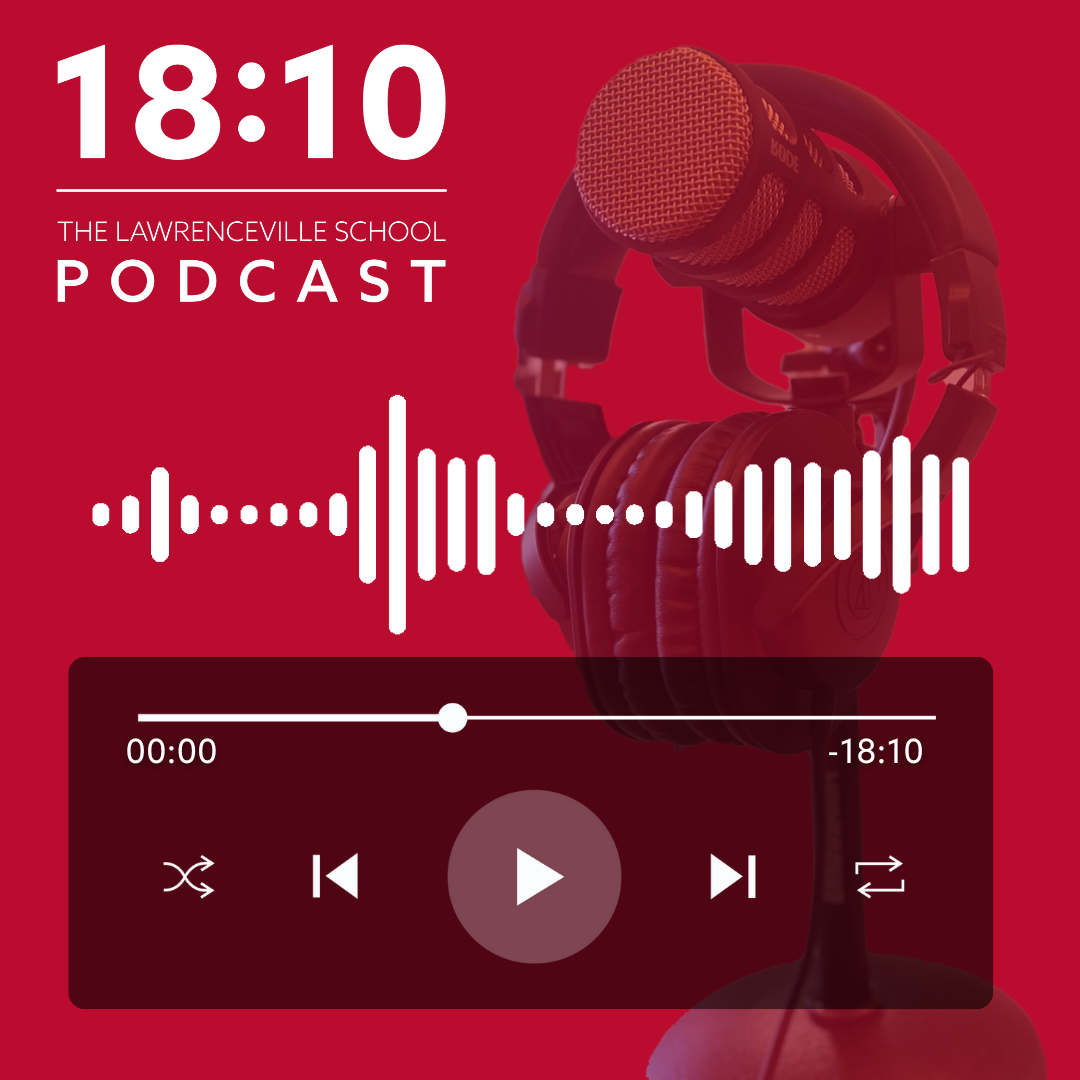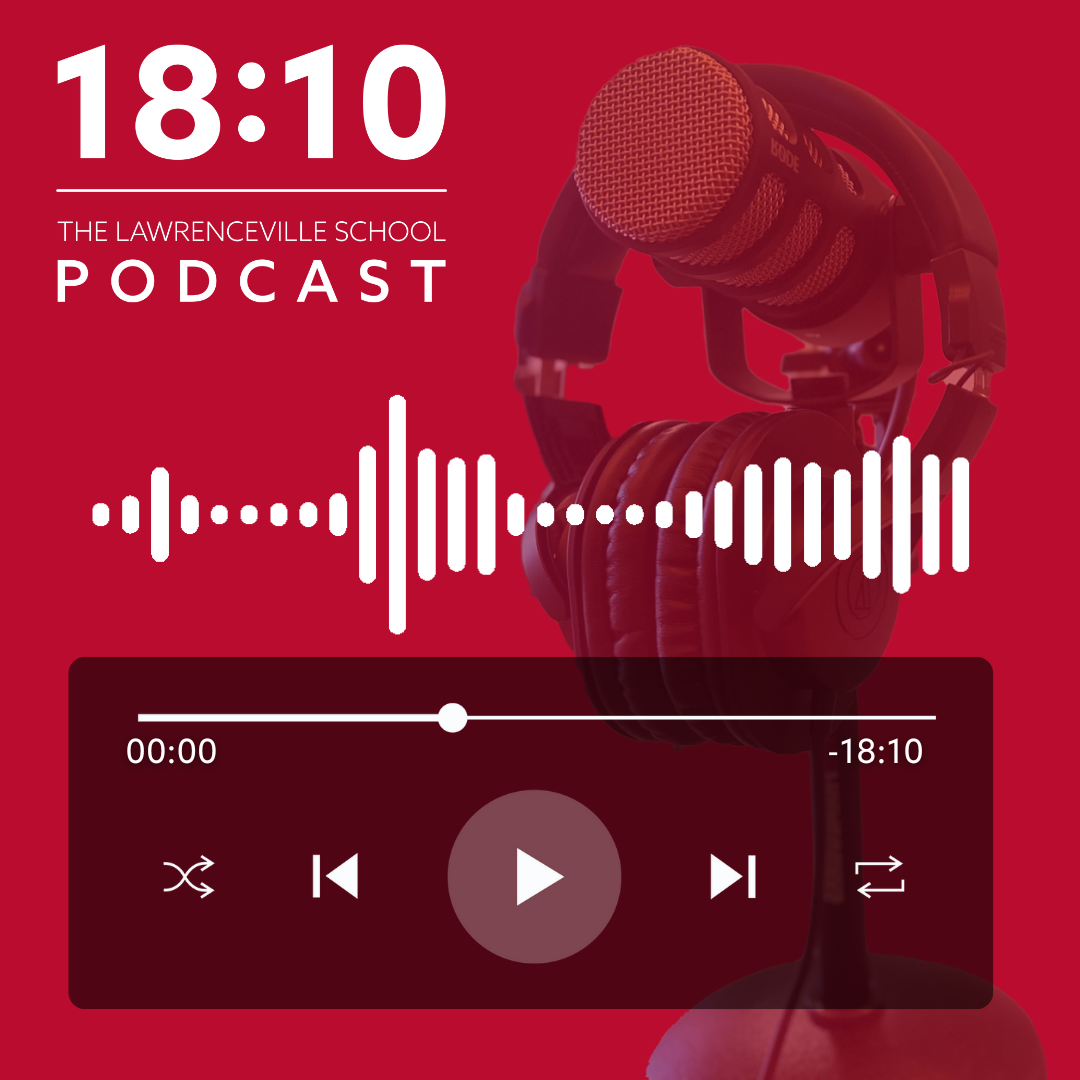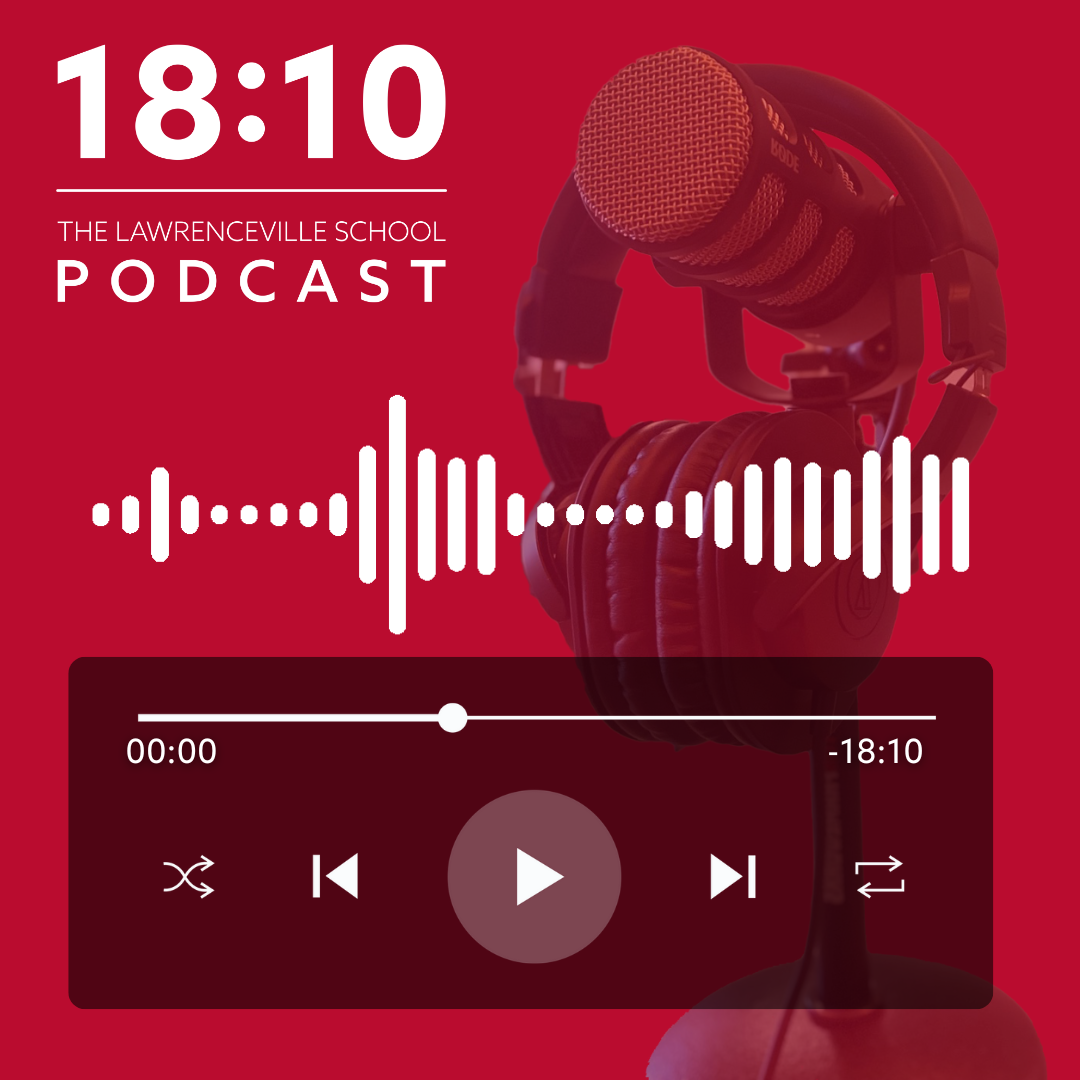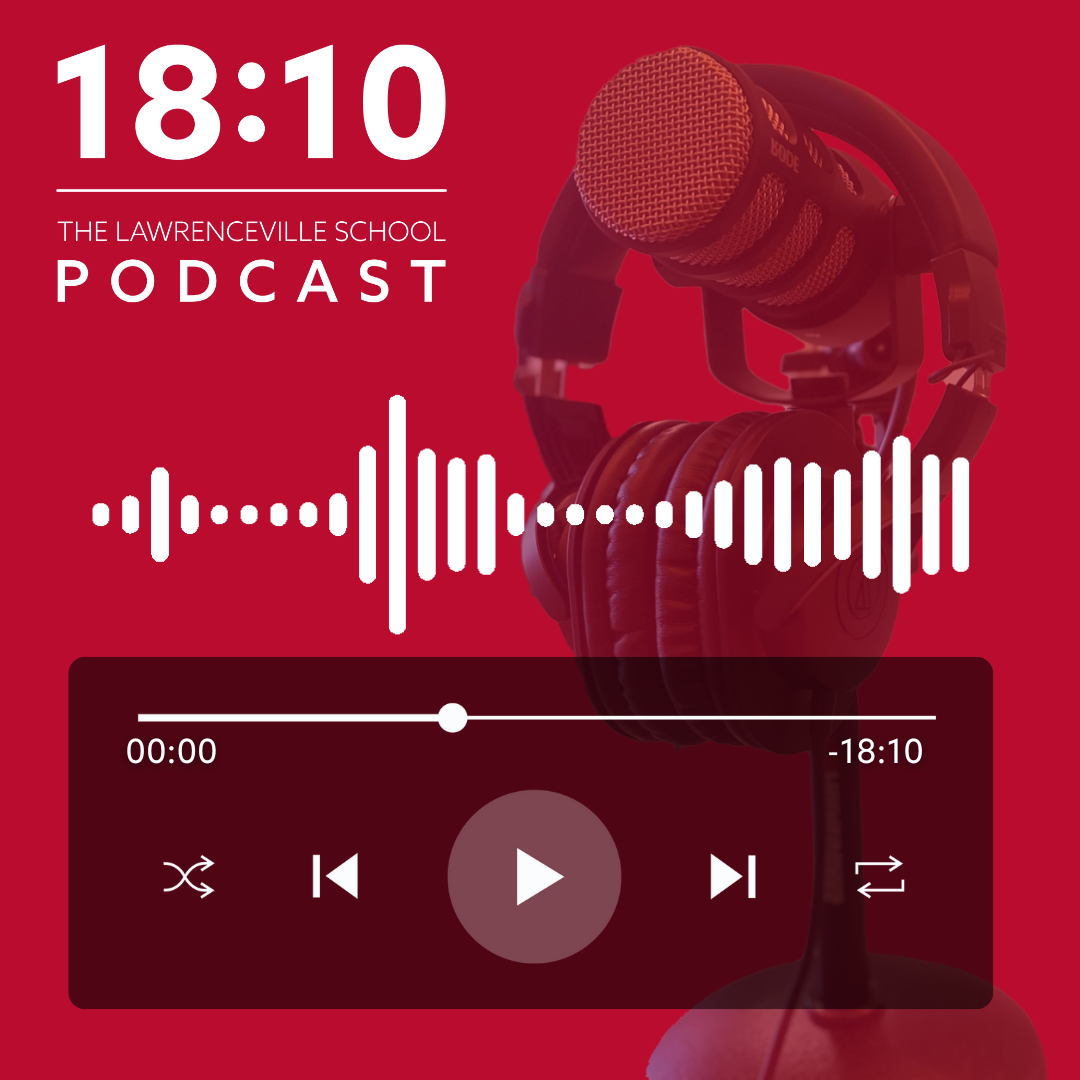Episode Transcript
[00:00:02] Speaker A: Welcome to 1810, a podcast produced by the Lawrenceville School.
In 18 minutes and 10 seconds, we explore the future of education with insights from bright minded individuals, inspiring new ways of thinking.
Speaking of bright minded individuals, I'm joined today by Bree Thompson, a Lawrenceville graduate and a wonderful current member of the faculty. Bri, what are some of the things that define your work here at the school?
[00:00:29] Speaker B: Hi Pierre. Good to be here with you.
In this second stint at Lawrenceville. I am teaching in the science department. I coach girls JV soccer. I'm a proud faculty member at the ropes course and I'm also newly the assistant head of house of the Great Woodhull House.
[00:00:47] Speaker A: Congratulations on your appointment to Wood. Lucky them. And lucky you.
Appreciate your mentioning being part of the ropes course faculty. That of course is where you and I first connected when you were a student. So I should acknowledge. My name is Pierre Koestra. I'm a member of the English department. I work in outdoor programs in a variety of ways. I coach a sports option called Outdoor Leadership. And of course we work together with our ropes course instructors and all the students whom we get climbing. I also have the privilege of serving as the Sykes Dow Master Teaching Chair in Harkness Learning. And that's what brings us together today. First, let's focus a little bit on your life as a student. When you look back on your life here as a teenager and you think about Harkness education, what are some of the principles and practices that stand out to you most as really important?
[00:01:41] Speaker B: I think that if I were to describe Harkness and sort of Harkness 101 to someone who is not familiar, there's a lot of personal accountability.
There is a lot of needing to be prepared outside of class, working on things and thinking about things and coming into class ready to converse with your peers and challenge one another, I think that's central to heartless learning. I would also say in that same vein, heart learning, deeply collaborative. You know, we're working with one another to make sense of texts, of concepts. So that's really what Harness gave me when I was a student at Lawrenceville. And it was something that continued to serve me throughout my educational career and then also my professional career.
[00:02:26] Speaker A: I'd say, can you talk about that a little bit?
The good hard work that you did here at Lawrenceville, of course, set you up for a remarkable opportunity studying in college at the University of North Carolina as a Moorhead Kane Scholar. What are some of the ways in which Harkness principles and practices helped you to do that very high level university.
[00:02:48] Speaker B: Work at Chapel Hill Harkness helps you to develop your ability to articulate yourself. And I think articulation is made up of two things. It's made up of thinking internally, like what are my ideas, how do I want to piece those together? And then verbally or you know, sometimes written, but verbally expressing them. So I think, you know, UNC is a pretty big school, so not every class was at Lawrenceville's golden ratio. But in my seminar classes in particular and just in opportunities to work with peers. And this was true at unc. This was true when I was a PEN fellow. But being in a Hartness style learning environment helps you understand the power and I would think like promise that working with your peers deeply can give you in terms of understanding things. So I think that's really like what it gave me and allowed me to be successful in my collegiate experiences and post Lawrenceville experiences.
[00:03:44] Speaker A: You and I know of course what a Penn Fellow is. Can you help our audience to understand what you were doing when you were enrolled in that program?
[00:03:53] Speaker B: Absolutely. So Penn gse, which is the Graduate School for Education at the University of Pennsylvania, has a program, it's called I Star the Independent School Teaching Residency where you are two doing the coursework for a Master's of Science in teaching while also being stationed at a either day or boarding independent school. I was fortunate to be back at Lawrenceville. But really you're just teaching and learning at the same time. So you're completing Masters of Science and Education coursework and you're also on the ground in the field doing the work as well. So it was a really unique experience to be able to learn something in a classroom environment and then immediately apply that definitely made me have a deeper appreciation for pedagogy and for the things that I think to circle back to Harkness. Harkness is trying to do for students and sort of like thinking deeply about how we want to teach students in a classroom.
[00:04:47] Speaker A: It was really striking to me when you were talking about being a student here and how that set you up for university level scholarship, how one of the things you had to do was to learn to prepare really conscientiously and then to articulate yourself very carefully in class.
One of the things you mentioned along with that was how class is collaborative and one engages in a lot of conversation with fellow students.
I love that word conversation, right? Not just expressing oneself, but doing so with other people. I'm curious, how does working on this close, careful study of things and the articulation of very closely observed details grow as you engage in collaborative conversation with other people. How does interaction with other people help you to form fuller, finer understandings of complex phenomena?
[00:05:42] Speaker B: That's a really great question, and I think I'll bring it to the science context immediately because I think that when we talk about conversation and we talk about dialogic teaching and things like Harkness, we immediately think of the humanities because we think of things that, you know, initially seem very open ended and sort of open to multiple interpretations.
So when you get them in science class, you want them to understand immediately that the scientific method is inherently rife with contradictions. It's inherently challenging. There's a struggle there. There's not one right answer. It's many different answers and many different ways of thinking about things. So I think that the close work of conversation is super helpful in understanding particularly scientific phenomena because there's so much minutiae that you have to grapple with, there's so much jargon, There can be so many different ways to mix up terminology. So I think explanation and conversation, those two work together to build understandings of things, even if they don't have all the words yet. There are other ways to think about these things. And I think conversation with peers is how they develop a true understanding of it and a true way to take this information that they're learning in class and apply it to something that they're seeing in. In the outside world.
[00:06:58] Speaker A: What might that look like? How might students be in active conversation with each other and through that process move from memorizing bits of basic information about a body system, like the circulatory system, to understanding how its parts interact with each other.
[00:07:17] Speaker B: I think that one of the primary ways that we try and do this in our science curriculum at Lawrenceville is present students with challenges and present them with contradictions. I think a lot about something that our second informers do in the winter term. Often it's called the differential diagnosis experiment. But it's after they've sort of spent some time learning the facts, so to speak, and getting comfortable with some of the language that they're now given a problem. They're given a patient and they're told, you have to work with this patient, you have to sort of assess their symptoms. And they're working in groups to try to take this understanding that they have and connect it to these things that they're seeing.
So I think, especially in science, it's more than just, okay, you're going to tell me back what we memorized last Night. You know, when we're in our 500 level classes with students, they're designing experiments that as they're conducting them, they're realizing that there's a problem. And the only way for them to move through that is to take their understandings of concepts and their ability to work with their peers and go, hey, I think that this is supposed to be happening because of what I understand here.
I'm getting this. What do you think? How can we work together to solve this problem? So I think there are a lot of different ways, but we definitely start them in the second form and try to build those skills up. Throughout their time at Lawrenceville, there's so.
[00:08:41] Speaker A: Much in what you just said, I'm struck by the fact that you were talking about students designing their own experiments, the fact that they then confer with one another about what they're seeing. I loved also how you talked about how they often arrive at moments when they say things like, I thought I understood, but now I'm encountering a problem, and I need to confer with my colleagues to figure out what are we actually observing and what are its actual ramifications? Where. Where do we go from here? I can't resist saying, Bri, that one of the things that I find helps my students in a literature course to make breakthroughs is when I say to them, you guys are operating to a large degree on the premise that one can read in a pretty free, associative way a work of literature, particularly if it's a work of fiction. A lot of students operate on the assumption that a work of fiction can be interpreted in any way that they want. And of course, that isn't the way that language works. It offers a lot of room for interpretive latitude. But if they make of the words, the details, the latest moves of the characters, anything that they want, they're often reading really badly. And so I often encourage them to get their different subject disciplines to converge and spend more time operating according to the scientific method. Observe very closely and carefully record your own observations before you encounter other people and confer with them. Then share what you're thinking in the form of a hypothesis. And know that presenting a hypothesis requires you to test it and be open to refining it, or, if necessary, rejecting and replacing it. I'm curious, what are some of the phenomena that students observe that you find are best at helping them to learn how to really internalize these elements of scientific learning and thinking?
[00:10:40] Speaker B: One thing that I think is really interesting about what you just said is this notion that you're imploring your students to take works of fiction and assess them with the scientific method. And I'm working with my students to get them to use adjectives to describe words that they are trying to memorize out of some book. I think that it's really interesting, and I feel like that is to bring it back to Harkness. That's like the core of Harkness, which is you're taking something from one discipline and you're using it in the other one. Because the more language you use to associate to this term, the easier it will be for you to recall its function and thus its structure, perhaps, and the larger things it's doing in the body. So that was something that really stuck out to me there. But I think a phenomena that students have a better time of understanding, so to speak, after sort of collaborative work, deep work. I think that when we work on understanding climate change at large, that's something where students, you know, take kernels of knowledge that they're picking up throughout the term. And then as we start to look at problems and look at ways to assess problems, they're going, huh. I thought that maybe this would work. But actually there are other factors involved that make it so that it's not just this linear relationship. They really understand that a lot better. Once you start to give them multiple different problems and say, go, you've heard about this before. You've maybe seen it on the Internet. You've heard adults talking about it. You've maybe seen it on the news or in a newspaper, if we're still reading those. So make sense of it now. And that, I think, really prompts them.
[00:12:20] Speaker A: One of my favorite bits of pedagogical wisdom is Terry Doyle's assertion that the one who does the work does the learning.
And of course, one is most automatically, most naturally drawn into working at something, getting into a real flow, if there's something to figure out.
I should sort of take a time out here to say, Edward Harkness, when he was a high school student at a boarding school, you know, early in the 20th century, found himself miserable because students in his context and the vast majority of schools weren't allowed to figure things out. They were told by lecturers, these are things you have to know. Memorize them, stand up here on the declamation platform and regurgitate them, and we will grade you on your ability to memorize what we have told you to know and, in fact, to think so, as somebody with a tremendous fortune, which had been made first by his father, who was A silent partner of John D. Rockefeller and Standard Oil, he wanted to use his vast wealth to revolutionize American education and figure out how to help students first to have a more positive experience and then to be much more useful members of communities and of society as a whole by teaching them how to really think for themselves and also to think in consultation with other people and to think about other people and how to consider their needs, their experience, their well being. And all of that I find so interestingly and intimately related to what you're talking about, right? Not only how do we do science, but what do we use it for? And not only how do we read works of literature and history and so on, but what do we do with them? When we have students studying philosophy and religion, learning how to produce works of art, what do we do with that? And one of the things, again that I always emphasize with my students is that that process that is so essential to the practice of science, critical review.
We have an idea, we've worked really hard on developing it. Does it actually work? Does it align with the facts? Do we even know enough of the facts to be able to exercise responsible critical review? What else do we need to explore in order to figure out if we're on the right track? And then again, what do we do with that? I'm curious, in what ways do you see these processes of learning that have to do with, first of all, integrative thinking, pulling together disparate, complicated bodies of information, and then critical thinking, trying to figure out, is this working?
Where is it not working? After all, we human beings in some respects are so often wrong. What you were talking about students designing experiments. What do we need to design in order to test the accuracy, comprehensiveness, veracity of what we've been thinking here? How do all of those processes in your experience extend beyond the classroom in important ways in student life, in the life of this particular learning community?
[00:15:30] Speaker B: I think that, and I hope that my fellow science teachers out there agree with me on this one in some respect. But I think that something inherent to the scientific method is open mindedness.
And I think that what you can get from the acts of collaborating outside of developing your thinking is developing socially and emotionally. And I think that's something that is extremely important in the work that we do here. I think that's central to Harkness and central to collaborative learning. And I think the kinds of learning environments we try to cultivate here at Lawrenceville. So those are some of the things that you will take away the ability to go.
I put a lot of myself into this work and I care about it. And maybe it's wrong, but that doesn't mean that it's bad or that I'm bad or that the person who is giving me this feedback is telling me this because they think that I'm bad. I think that it allows you to recognize that sometimes the process is what is to be rewarded and is what is to be thought of and not the nature of the result. And those are some things that I know that I took away because I can think about being an adolescent and wanting my interpretation of something or my way of designing something to be the way. And when it's not, you feel a sort of disappointment that I think can be stifling. But in the right learning environments and in the right communities that remind you that this is the important thing, you see that as a strength and you see it as something that's motivating. And then you're able to dialogue with yourself, past and present, like, what was I doing there? Maybe, you know, I don't need to do that and I should do this instead. Those are some of, I think, the most powerful things that you can take away from all of this.
That's 1810 for today. Inspiring ideas from Lawrenceville to you. We look forward to our next exploration.
If you have comments or questions about today's episode, please reach out to communication lawrenceville.org we're always interested to hear your ideas. A transcript of today's episode is available at elville1810.kastos.com 1810 is produced and edited.
[00:17:45] Speaker A: By the Communications Department at the Lawrenceville School with Engineering by Sheun Aladeshe.
Special thanks to Jess Welsh, Andrea Fereshte and Lisa Gillard for their inspiration and guidance.
[00:18:01] Speaker B: Ha.



